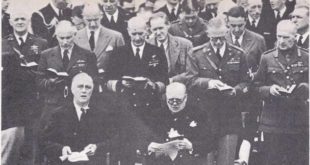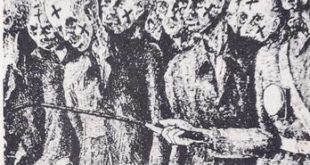On October 4, 1957, the Soviet Union announced to an astonished world that its scientists had launched into orbit an artificial satellite of the earth. The Russians called the satellite “Sputnik,” or little moon. With the invention of the air plane, man had broken the bonds that confined him to the earth; now he could go beyond the ocean of air that surrounded the earth and explore the wonders of space. The way was open for discoveries that promised to surpass those of the age of exploration of the fifteenth and sixteenth centuries. The United States sent up its first …
Read More »The Great Society 1964 – 1965
In the United States election campaign of 1964, President Johnson was the candidate of the Democratic party. His Republican opponent was Senator Barry Goldwater of Arizona, who was known for his controversial stand on many issues. Goldwater called for a radical change in the Policies of the government. He opposed the reforms enacted since the early 1950’s, as well as attempts to match agreement with the Communist nations, arguing that Communists understood nothing but force. He deplored United States recognition of the Soviet Union and on occasion, even advocated that the United States withdraw from the United Nations. In answer …
Read More »Death of a Dictator 1946 – 1953
AS THE SKY darkened over Moscow on the evening of March 5, 1953, thousands of people waited in line before a building called the Hall of Columns. Some of them wept; some carried flowers. Moving slowly and silently toward the entrance, they could see a forty-foot portrait of Premier Josef Stalin, framed in gold, which hung on the side of the building. News of Stalin’s death had been announced late that afternoon and now he lay in state in an immense room whose marble columns were draped in flags of red and black. Four days later, Stalin’s body was carried …
Read More »War in Korea 1945-1953
Although the cold war was the most important fact in the politics of the post-war world, few persons could have foreseen that it would lead to fighting in the small, remote country of Korea. Yet, as small and remote as it was, Korea had a strategic location. It was near three large powers — Russia, China and Japan — and the Japanese said it “points like a dagger at the heart of our country.” The Japanese won control of Korea in the Russo-Japanese War and by 1905 they ruled it as part of their empire. During World War II, the …
Read More »The United Nations and the Nations Disunited 1943 -1949
So at last, in the Pacific as in Europe, the guns were silent; the nations that had brought so much death and destruction to the world had been defeated, but victory alone was not enough. Governments had to be set up for the defeated nations, the destruction of war had to be repaired, hungry people had to be fed, industry and commerce had to be set in motion. Even more important, a way had to be found to keep war out of the world, to settle disputes between nations by peaceful means rather than by violence. The League of Nations, …
Read More »Victory in the Pacific 1941 – 1945
On June 25, 1940, the Japanese war minister said, “The present international situation is developing in a manner advantageous to Japan’s national policy. We should not miss the present opportunity. . . Japan’s national policy was scarcely a secret. It had already linked itself by treaty to the aggressor nations of Germany and Italy – for several years it had been fighting an undeclared war against China. Although Chinese guerrilla forces were fighting back the Japanese controlled most of the Chinese railroads and held such cities as Peiping, Shanghai and Canton. They planned to establish something they called the “Greater …
Read More »A World at War 1939 – 1941
Now the people of Europe began to hear a new sound, a sound that would haunt them throughout the years of war — the wail and shriek of air-raid sirens. At night, the lights of Europe went out and the “blackout” made familiar streets strange places of darkness. Street lamps were left unlit and windows were covered with heavy draperies. Any stray gleam of light might help guide enemy bombers to their targets. Hurrying about their wartime duties, the people of Britain and France began to wonder. They had not wanted war and yet war had come. Why? What had …
Read More »Victory in Europe 1941 – 1945
Even before Pearl Harbour, there had been cooperation between the United States and Britain. In August of 1941, President Roosevelt and Prime Minister Churchill met secretly, on a cruiser at sea off the coast of Newfoundland. There they drew up the Atlantic Charter, a document stating the principles on which they based their hopes for a better future for the world. They pledged that neither country would seek more territory. They hoped that, “after the final destruction of Nazi tyranny,” all men in all lands could “live out their lives in freedom from want and fear,” and they called on …
Read More »The Election of 1936
As Roosevelt’s first term in office neared its end, many people in the United States — and in other countries — wondered if the New Deal could really solve America’s problems. More than that, they wondered if Americans would continue to follow the path of democracy. A wave of totalitarianism was sweeping the world; would it reach as far as America? There was no doubt that there were some Americans who supported Hitler and the Nazis. Members of the German-American Bund paraded in brown shirts and held a mass meeting in New York’s Madison Square Garden, but there were comparatively …
Read More »The Meaning of Totalitarianism
So it happened that in many parts of the world people were living under a system of government that came to be called totalitarianism. There were differences in the governments of the totalitarian countries, but they were alike in certain important ways. In each of them, the government was controlled by one political party, usually under a dictator and no other political parties were allowed. The ruling party was not satisfied to control the government; its aim was total control of the life of its people. It controlled the courts and the armed forces, labour and industry, science and the …
Read More »








